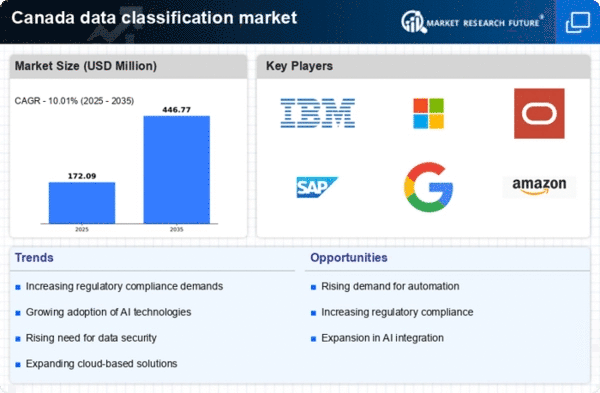Rise in Cybersecurity Threats
The escalating cybersecurity threats in Canada are significantly impacting the data classification market. With cyberattacks becoming more sophisticated, organizations are compelled to adopt advanced data classification solutions to protect sensitive information. Recent reports indicate that Canadian businesses have experienced a 30% increase in cyber incidents over the past year. This alarming trend underscores the necessity for effective data classification strategies that can identify and secure critical data assets. The data classification market is likely to see heightened demand as organizations invest in technologies that enhance their cybersecurity posture. By classifying data based on sensitivity and risk, companies can implement targeted security measures, thereby mitigating potential threats and ensuring compliance with data protection regulations.
Adoption of Cloud Technologies
The rapid adoption of cloud technologies in Canada is influencing the data classification market. As organizations migrate to cloud-based solutions, the need for effective data classification becomes paramount. Cloud environments often host vast amounts of data, necessitating robust classification systems to manage and secure information effectively. Recent data indicates that over 50% of Canadian businesses are utilizing cloud services, which is likely to drive the demand for data classification solutions tailored for cloud environments. The data classification market is expected to experience growth as companies seek to implement classification frameworks that align with their cloud strategies. By classifying data in the cloud, organizations can enhance data management, security, and compliance efforts.
Increased Focus on Data Analytics
The growing emphasis on data analytics in Canada is driving the data classification market. Organizations are increasingly leveraging data analytics to gain insights and make informed decisions. As a result, there is a heightened need for effective data classification solutions that can organize and categorize data for analytical purposes. Recent studies suggest that approximately 60% of Canadian companies are investing in data analytics initiatives, which in turn fuels the demand for data classification technologies. The data classification market is poised to benefit from this trend, as businesses seek to enhance their analytical capabilities. By implementing robust data classification systems, organizations can ensure that relevant data is readily accessible for analysis, ultimately leading to improved business outcomes.
Growing Demand for Data Governance
The increasing emphasis on data governance in Canada is driving the data classification market. Organizations are recognizing the necessity of managing data effectively to comply with regulations and enhance operational efficiency. According to recent statistics, approximately 70% of Canadian businesses are prioritizing data governance initiatives. This trend is likely to propel the demand for data classification solutions, as they play a crucial role in organizing and categorizing data. The data classification market is expected to benefit from this growing focus, as companies seek to implement robust governance frameworks that ensure data integrity and accessibility. Furthermore, the integration of data governance practices is anticipated to lead to improved decision-making processes, thereby enhancing overall business performance.
Emergence of Data Privacy Regulations
The emergence of data privacy regulations in Canada is a key driver for the data classification market. With the introduction of laws such as the Personal Information Protection and Electronic Documents Act (PIPEDA), organizations are required to classify and manage personal data effectively. This regulatory landscape is compelling businesses to invest in data classification solutions that ensure compliance and protect consumer information. Recent surveys indicate that nearly 75% of Canadian organizations are prioritizing compliance with data privacy regulations, which is likely to boost the demand for data classification technologies. The data classification market is expected to thrive as companies seek to implement systems that facilitate adherence to these regulations, thereby enhancing their reputation and trust among consumers.
















